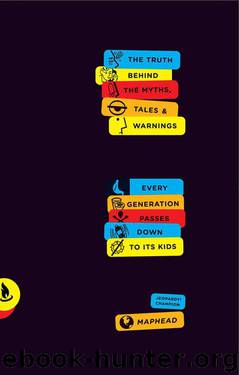Because I Said So!: The Truth Behind the Myths, Tales, and Warnings Every Generation Passes Down to Its Kids by Ken Jennings

Author:Ken Jennings [Jennings, Ken]
Language: eng
Format: epub, mobi
Tags: Non-Fiction
ISBN: 9781451656251
Publisher: Scribner
Published: 2012-12-04T00:00:00+00:00
TRUE.
“Wash your hands after you use the bathroom!”
After reading the research in the previous entry, in which toilet seats were held up as paragons of spotless purity compared to the cesspool that is the sink, you might be forgiven for wondering: in that case, why do I wash my hands after I go to the can? Isn’t that just loading up on new microbes to take with me?
It’s true that bathroom sinks, particularly in public restrooms, can be bacteria farms, because of all the just-went-to-the-bathroom people who congregate there. You certainly don’t want to touch the surfaces there more than necessary. But just because sinks are grodier than toilet seats (because toilet seats stay drier, mostly) doesn’t mean they’re not cleaner than all the other, uh, surfaces you touch during your whole bathroom process. (Whatever that may be. Not my business.) As a result, doctors call hand-washing the single most important thing you can do to avoid illness. The World Health Organization estimates that frequent hand-washing reduces your chances of respiratory disease by 24 percent and cuts in half your chances of contracting a stomach bug.
But only if you do it right! When Americans are asked in surveys, 92 percent claim to be hand-washers, but when researchers actually stake out public restrooms, the number is closer to 83 percent. And even the people who do stop by the sink make a fairly half-assed attempt. (This is a scientific term, because they leave literally half the ass still on their hands.) A thorough hand-washing takes twenty seconds of vigorous soap-scrubbing, say the bacteria-counters, and two-thirds of us don’t even use soap. Our average scrub time: eleven seconds. If you make one of these token “Don’t judge me!” attempts at hand-washing at a public restroom sink, you’re probably just making things worse: you’ve chosen to hang out at the grossest place in the room, and you’re not even going to wash well while you’re there dipping your hands in the microbial cocktail.
A 2008 study from a London university found that there’s a wrong way to dry your hands as well. Those electric warm-air dryers actually doubled the number of bacteria on subjects’ hands in the drying process, and the newfangled jet-air ones, the ones that can supposedly blow air on your hands at four hundred miles per hour, were capable of spreading the germs from your hands in a two-meter radius around the dryer. Good old-fashioned paper towels, by contrast, wiped away about 76 percent of the remaining bacteria and didn’t spread a thing. (Don’t feel too guilty about the environmental impact of paper towels. A 2002 report from Franklin Associates found that the use of a single paper towel had essentially the same carbon footprint as thirty seconds under a 2,400-watt dryer. More efficient dryers and/or recycled paper towels will change the math slightly, but any difference will be small.)
There is one time when a good, thorough hand-washing has been proved to be harmful: when the soap dispenser itself is full of contaminated soap.
Download
Because I Said So!: The Truth Behind the Myths, Tales, and Warnings Every Generation Passes Down to Its Kids by Ken Jennings.mobi
This site does not store any files on its server. We only index and link to content provided by other sites. Please contact the content providers to delete copyright contents if any and email us, we'll remove relevant links or contents immediately.
| Coloring Books for Grown-Ups | Humor |
| Movies | Performing Arts |
| Pop Culture | Puzzles & Games |
| Radio | Sheet Music & Scores |
| Television | Trivia & Fun Facts |
Spell It Out by David Crystal(36117)
Professional Troublemaker by Luvvie Ajayi Jones(29663)
The Secret History by Donna Tartt(19090)
We're Going to Need More Wine by Gabrielle Union(19046)
Cat's cradle by Kurt Vonnegut(15356)
The Goal (Off-Campus #4) by Elle Kennedy(13674)
The Social Justice Warrior Handbook by Lisa De Pasquale(12190)
The Break by Marian Keyes(9368)
Crazy Rich Asians by Kevin Kwan(9292)
The remains of the day by Kazuo Ishiguro(8999)
Thirteen Reasons Why by Jay Asher(8910)
Educated by Tara Westover(8054)
The handmaid's tale by Margaret Atwood(7764)
Giovanni's Room by James Baldwin(7346)
Win Bigly by Scott Adams(7198)
This Is How You Lose Her by Junot Diaz(6887)
The Rosie Project by Graeme Simsion(6415)
Six Wakes by Mur Lafferty(6258)
The Power of Now: A Guide to Spiritual Enlightenment by Eckhart Tolle(5782)
